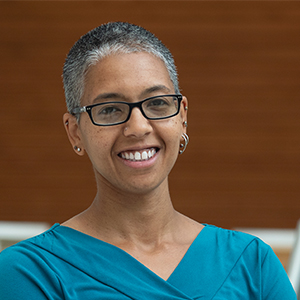Rebecca Hubbard
Professor of Biostatistics, Perelman School of Medicine, University of Pennsylvania
Education
PhD, Biostatistics, University of Washington
MSc, Applied Statistics, with honors, Oxford University
MSc, Epidemiology, University of Edinburgh
BS, Ecology and Evolution, summa cum laude, University of Pittsburgh
Growing up in West Chester, Pennsylvania—a suburb of Philadelphia—Rebecca Hubbard loved to write stories and poetry. Her dream job was to become a science fiction writer, but she was a practical kid and recognized that probably wouldn’t pay the bills. Since she excelled at science and math, she figured becoming a scientist was a better bet for a stable career.
Hubbard was determined to go to college from a young age, but she didn’t have a good understanding of the training necessary to become a scientist. Consequently, she started out college pre-med because becoming a doctor was something she could understand. However, she knew she wasn’t a “people person” and didn’t have any interest in the clinical side of medicine.
After a few semesters as a research assistant in a wet lab, Hubbard learned she has “bad lab hands” and doesn’t do well in a lab environment. She decided to stick with biology, but declared a major of ecology and evolution because ecology research generally dealt with things that were large enough she “couldn’t screw up the experiments.” Measurement used yard sticks instead of micrometers, which was a lot more her speed.
At the time, Hubbard was a math tutor and teaching assistant for calculus, but it never really occurred to her that math could be an occupation. After several semesters conducting research in swamps and bogs and being eaten alive by mosquitoes and chiggers, she knew a career in ecology was not what she was looking for. Hubbard learned about the Harvard Summer Program in Biostatistics—a field she had never heard of before—while looking for summer research opportunities and decided to give it a try. This changed her life, and she is thankful to Louise Ryan, who started the program and ran it for many years.
Hubbard saw right away that biostatistics could bridge her interests in biology and math and allow her to contribute to science without spending hours in a lab or schlepping through swamps. The following fall, she applied to graduate school and ultimately earned master’s degrees in epidemiology and applied statistics before completing her PhD in biostatistics at the University of Washington.
One of Hubbard’s proudest moments was successfully defending her dissertation. After her defense, she remembers walking the hard copy of her dissertation to the graduate school office with her dissertation supervisor, Lurdes Inoue, and dropping it through the slot for completed dissertations. “Good-bye, dissertation! Good-bye, seven years of postsecondary education,” she exclaimed.
Today, Hubbard writes papers instead of poetry and science instead of fiction, but thinks she didn’t end up too far from where she started on the whole. She was the first person in her family to complete a PhD, and she is grateful to people like Ryan and Inoue, who helped her find her way. As a faculty member, it is her great honor to help talented students decode the academic maze and find their way, too.


















